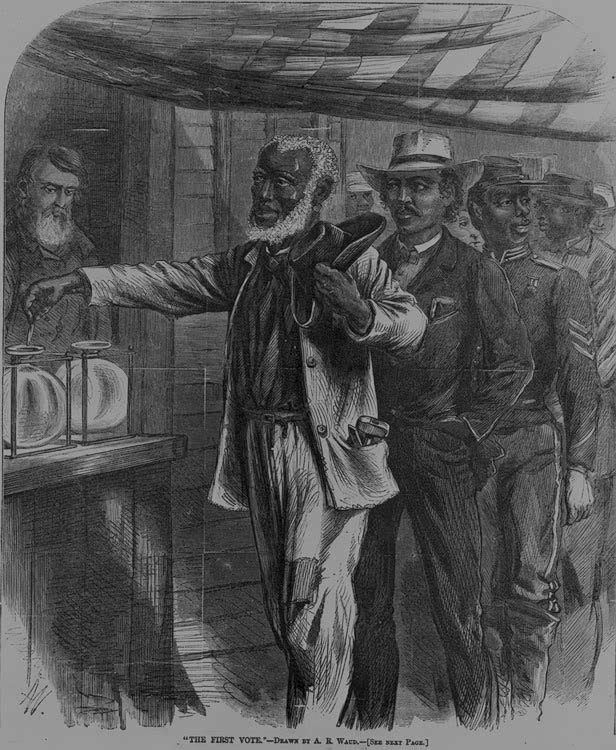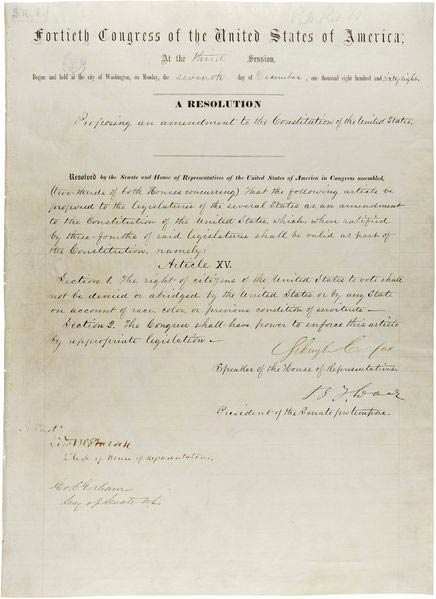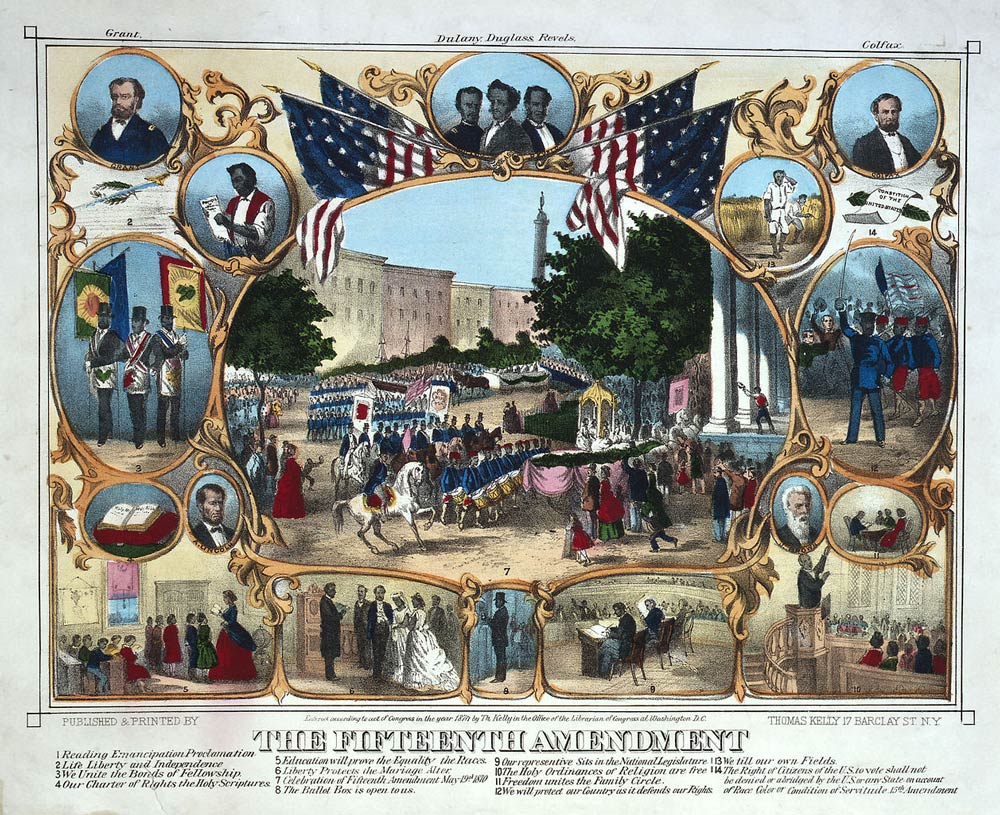| United States Constitution | |
|---|---|
 |
|
| The U.S. Constitution | |
| Preamble | |
| Articles of the Constitution | |
| I ‣ II ‣ III ‣ IV ‣ V ‣ VI ‣ VII | |
| Amendments to the Constitution | |
| Bill of Rights | |
| I ‣ II ‣ III ‣ IV ‣ V ‣ VI ‣ VII ‣ VIII ‣ IX ‣ X | |
| Additional Amendments | |
| XI ‣ XII ‣ XIII ‣ XIV ‣ XV ‣ XVI ‣ XVII ‣ XVIII ‣ XIX ‣ XX ‣ XXI ‣ XXII ‣ XXIII ‣ XXIV ‣ XXV ‣ XXVI ‣ XXVII | |
| View the Full Text | |
| Original Constitution | |
| Bill of Rights | |
| Additional Amendments |
The Fifteenth Amendment, adopted on February 26, 1869, was the third in the Reconstruction Amendments which were adopted after the Civil War. This particular amendment prohibits any government entity within the United States from denying a citizen the right to vote based upon the person’s race, color, or previous position of servitude (slavery, for example).
Text
Section 1. The right of citizens of the United States to vote shall not be denied or abridged by the United States or by any State on account of race, color, or previous condition of servitude.
Section 2. The Congress shall have power to enforce this article by appropriate legislation.
Basis for the Amendment
This amendment was borne from the inherent need for the country to reunite after a long, bloody Civil War. Congress recognized that the newly-acquired freedom of slaves would require certain actions to be taken in order to enfold those people into the citizenry.
This concept was not at all a universal one. Some of the southern states were outraged by the proposition that these former slaves would not only be allowed to vote, but would also be granted citizenship by that very action. A prime example is North Carolina, the Supreme Court of which upheld the amendment, which in turn evoked the North Carolina legislature to enact its own amendments to its state constitution that rescind the provisions for free men of color to vote.
Process
The process of obtaining ratification of this amendment was not an easy one. Legislators, wishing to unite the country while accomplishing the goal of freedom for all, were challenged to come up with a constitutional amendment that would serve the intended purpose without being doomed to non-ratification.
The House and Senate each adopted a draft of the proposed amendment. The House version was a bit more liberal in the allowances for eligibility to vote. It proposed that no one should be denied the right to vote on the basis of the usual “race, creed” and previous servitude. It also provided that such things as ownership of property, creed, and nativity shall not prevent one from being allowed to vote.
The Senate version was less wordy. It merely cited race, color, previous servitude, and also that of ancestry.
Both the House and Senate included the right to hold office in their drafts, along with the right to vote.
These versions were only two of several efforts to draft, rewrite, edit, and draft again the verbiage that would comprise the 15th Amendment. Some wanted to expound the list even further, adding such conditions as literacy and conditions of birth as reasons which were to not be considered. Others suggested just removing all of the conditions, and basically assert that all men over the age of 21 would be allowed to vote. This met with disapproval, though, due to some states fear that this would grant similar freedoms to the Irish who were not natives of the U.S. and also the Chinese who were living in the United States at the time.
In an effort to help ensure ratification, the committee charged with proposing the final language agreed to remove the clause about holding office, and decided to leave only the words “race, creed, and conditions of prior servitude” as the qualifiers for not being prohibited from the vote. Even so, ratification was not assured and Congress was apprehensive.
Four of the southern states who otherwise might have objected (Texas, Mississippi, Georgia, and Virginia) ratified the amendment without question due to the fact that it was a condition for them to obtain representation in Congress. Other states continued to have issue with how the amendment would affect the Irish who were not native to the U.S., as well as the Chinese. In fact, after ratifying the amendment, New York attempted to rescind their ratification on this very basis. However, their action was not sufficiently timely due to the fact that enough other states had ratified. New York’s ratification was no longer necessary and the matter was dropped.
In Summary
The right to vote has been one of the most sought-after, fiercely fought-for, and closely-protected rights of the United States Constitution, and the very manner in which it is protected is one of the factors that sets the United States apart from other nations that allow their citizens to vote.
It is interesting to note that, after the Fifteenth Amendment was ratified during the period between 1865 and 1880, more African Americans were elected to hold public office than during any other period in American history. Included in these elections to office were several positions within the legislature, with two holding office in the Senate and 14 elected as representatives in the House.


